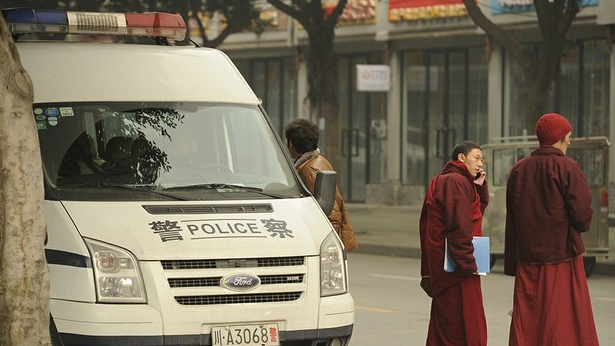Chinese authorities fanned out across Tibetan areas of China over the weekend, warning Tibetan monasteries not to host “outside visitors” during the 85th birthday on July 6 of exiled spiritual leader the Dalai Lama, a source in exile said.
Areas covered by the prohibition included monasteries in western China’s Sichuan and Qinghai provinces, and parts of the Kanlho (in Chinese, Gannan) Tibetan Autonomous Prefecture in the northwestern province of Gansu, RFA’s source said, citing contacts in the region.
“While introducing Chinese policy and relevant laws to the monasteries, the officials emphasized that no outside visitors would be permitted to stay there,” the source said.
In Sichuan province’s Kardze (Ganzi) prefecture, a government group led by Wang Shu Yin, a Communist Party official and head of the local police department, entered Ganden Phuntsok Ling monastery in Rongdrag (Danba) county on July 5 to conduct inspections, the source said.
“During their tour, the Chinese officials urged the residents to become ‘exemplary and patriotic’ monks and watch out for any outside visitors in the area and in the monastery itself,” he said, adding, “The officials urged the monks to report any suspicious persons to the local government or police department.”
Strict prohibitions against overnight visitors to the monastery had already been in place since 2019 in an effort to deter protests on the occasion of politically sensitive anniversaries such as the March 10th anniversary of Tibetan national uprisings against Chinese rule and the July 6 birthday of the Dalai Lama, the source said.
Greetings and well wishes meanwhile poured in from around the world on Sunday, the Dalai Lama’s 85th birthday, with Tibetans in Tibet defying Chinese prohibitions on celebrations by offering prayers and posting images of the revered spiritual leader online – often using oblique symbols.
“Many devotees in different parts of Tibet have made ritual offerings of juniper smoke to celebrate the birthday of the Dalai Lama,” a source in Tibet said in an earlier report, adding that other Tibetans had gone online to post images of the Buddhist deity of compassion, Chenresig, with whom the Dalai Lama is identified.
Other Tibetan netizens posted poems in celebration, with one addressing the well-loved spiritual teacher as “the glorious sun,” and another writing, “As long as you are present, our hope remains unflinching. May you live as long as space endures.”
Regarded by Chinese leaders as a dangerous separatist, the Dalai Lama fled Tibet into exile in India in the midst of a failed 1959 Tibetan national uprising against rule by China, which marched into the formerly independent Himalayan country in 1950.
Displays by Tibetans of the Dalai Lama’s photo, public celebrations of his birthday, and the sharing of his teachings on mobile phones or other social medial are often harshly punished.
Chinese authorities meanwhile maintain a tight grip on Tibet and on Tibetan-populated regions of western China, restricting Tibetans’ political activities and peaceful expression of cultural and religious identities, and subjecting Tibetans to imprisonment, torture, and extrajudicial killings.

